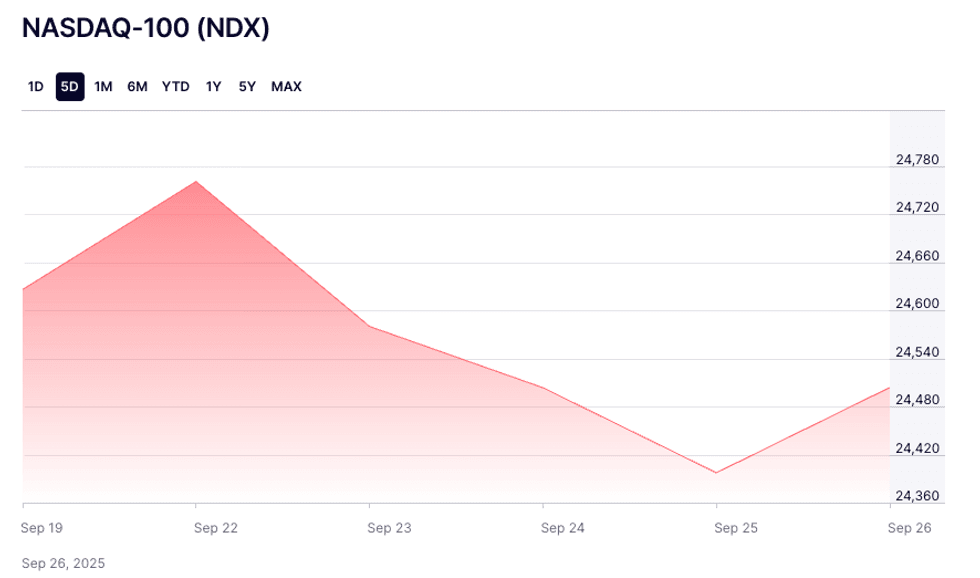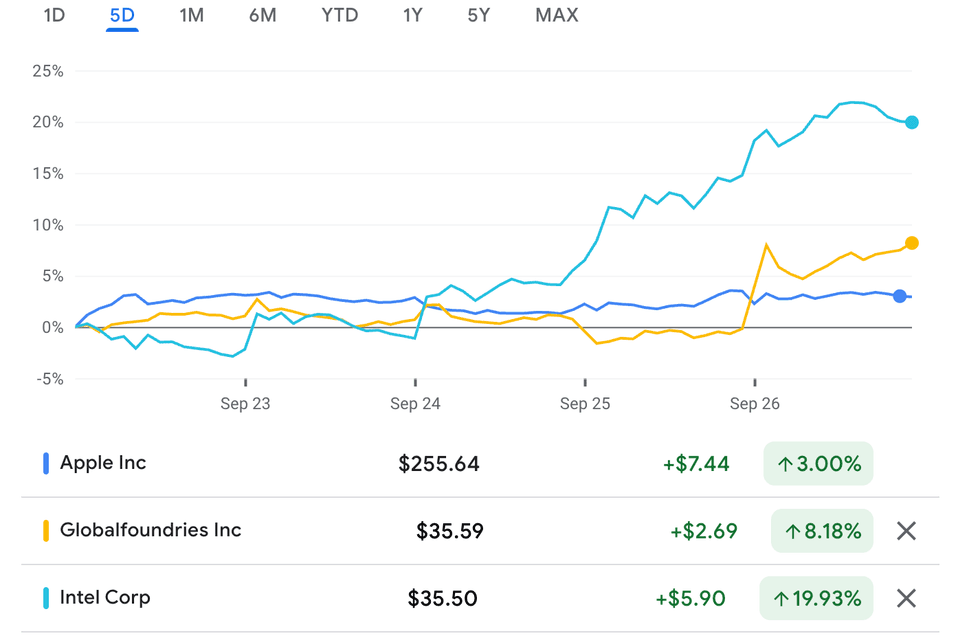Tech Weekly: Tech Stocks React to Fed, AI News and Geopolitical Tensions
Tech stocks were pressured by Fed signals this week. Meanwhile, NVIDIA's OpenAI deal boosted AI stocks, while Oracle's debt raised leverage concerns.

This week’s market action reflected renewed caution amid evolving signals from the US Federal Reserve, with tech stocks facing pressure from shifting interest rate expectations and renewed overvaluation concerns.
Artificial intelligence (AI) heavyweight NVIDIA (NASDAQ:NVDA) announced a US$100 billion investment partnership with OpenAI on Monday (September 22), deploying at least 10 gigawatts of NVIDIA-powered data centers.
The initial US$10 billion investment will occur once the first gigawatt is operational in late 2026. OpenAI will purchase chips from NVIDIA with this investment, and NVIDIA will receive non-controlling equity in OpenAI.
The news was initially met with optimistic market sentiment, buoying NVIDIA shares and related AI-focused tech stocks.
Similarly, data center developers experienced a surge in their stock prices due to the increasing need for AI infrastructure. This was further fueled by announcements of significant expansion projects, such as the Stargate initiative. This rally hasn’t translated to ongoing price momentum at this point.
Global markets gained ahead of Fed Chair Jerome Powell’s Tuesday (September 23) remarks, in Providence, Rhode Island, during which he offered cautious guidance and dimmed hopes for near-term rate cuts.
Meanwhile, Canada’s S&P/TSX Composite Index (INDEXTSI:OSPTX) marked a milestone, breaking 30,000.
The milestone came as Bank of Canada Governor Tiff Macklem stressed the urgent need for economic reforms to counteract risks from US trade protectionism and the US dollar's declining safe-haven status.
A more cautious tone emerged midweek, with analysts and investors weighing potential risks around the scale of the deal, including concerns about circular financing and renewed questions about market concentration.
Oracle's (NYSE:ORCL) issuance of US$18 billion in public debt to expand its AI data center operations fueled concerns about escalating leverage risks. Meanwhile, at the macro leve, factors such as stronger-than-expected US unemployment numbers, and geopolitical tension after US President Donald Trump’s contentious remarks at the UN General Assembly, contributed to a market pause. Major US indexes marked their third straight day of losses on Thursday (September 25), with the tech sector bearing much of the brunt.

Nasdaq-100 performance, September 19 to 26, 2025.
Chart via Nasdaq.
The market rebounded slightly on Friday (September 26) as the latest US personal consumption expenditures index data aligned with expectations, giving investors relief and a sense of continued stability.
The Nasdaq-100 (INDEXNASDAQ:NDX) and S&P 500 (INDEXSP:.INX) posted modest losses for the week, reflecting a wait-and-see mood heading into the fourth quarter.
3 tech stocks that moved markets this week
1. Apple (NASDAQ:AAPL)
- Share price performance: Shares of Apple have risen 11.45 percent since September 12 pre-orders, positively impacted by strong iPhone 17 sales exceeding expectations.
- News highlights: Demand for entry-level iPhone 17 models remains robust, with Morgan Stanley (NYSE:MS) analysts noting possible implications from extended delivery times.
2. Intel (NASDAQ:INTC)
- Share price performance: Shares of Intel rose 19.65 percent this week as the legacy tech company continued to strengthen its market position.
- News highlights: After securing funding from NVIDIA last week, Intel is reportedly seeking investment from Apple for its struggling chipmaking business, which is partly US government-owned. Early discussions also included closer collaboration between Apple and Intel, though an agreement is not guaranteed. Intel has also reportedly approached Taiwan Semiconductor Manufacturing (NYSE:TSM).
3. GlobalFoundries (NASDAQ:GFS)
- Share price performance: GlobalFoundries, a major US-based semiconductor manufacturer with significant domestic fabrication capacity, jumped as much as 11.49 percent on Friday after reports emerged of a new 1 to 1 ratio mandate.
- News highlights: The US said it is planning to implement a 1:1 chip production rule to reduce reliance on overseas semiconductor supply. Under this proposal, chip manufacturers would be required to produce domestically as many semiconductors as their customers import from foreign suppliers. Companies failing to maintain this 1:1 domestic-to-import production ratio over time may face tariffs.
ETF performance
Gains across AI-focused exchange-traded funds (ETFs) this week reflected ongoing investor optimism for AI innovation and infrastructure buildup. The VanEck Semiconductor ETF (NASDAQ:SMH) led the pack with a 1.74 percent increase, followed by the Invesco PHLX Semiconductor ETF (NASDAQ:SOXQ), which gained 0.85 percent, and the iShares Semiconductor ETF (NASDAQ:SOXX), which advanced by 0.82 percent.
Other market news
- The Trump administration’s proclamation imposing a US$100,000 fee on H-1B visas has sparked debate, with some industry leaders viewing it as a potential boon for tech recruitment in other countries due to increased cost pressures on US companies.
- Canada said it would launch a new AI task force aimed at revamping national AI policies to accelerate research commercialization and global market integration. The task force is tasked with delivering recommendations within 30 days.
- Palantir Technologies (NASDAQ:PLTR) said its AI Foundry platform will integrate advanced data analytics into Boeing Company (NYSE:BA) factories producing military aircraft and other defense assets, enhancing AI-driven operational efficiencies.
- Super Micro Computer (NASDAQ:SMCI) introduced new AI systems optimized for data centers and edge computing at INNOVATE! EMEA 2025. The portfolio features NVIDIA RTX Pro, HGX B300 GPUs, and edge-optimized processors that meet high-performance server and localized AI inference demands, with global manufacturing across the US, Netherlands, Taiwan and Malaysia.
- Micron Technologies (CSE:MWM) delivered strong fiscal Q4 2025 earnings, driven by surging AI demand for memory products in data centers. The company reported US$11.3 billion in revenue and US$3.2 billion in net income, significantly above expectations. Looking ahead, Micron forecasts robust revenue and margin growth for Q1 2026, buoyed by accelerating AI adoption. The market reacted positively, with shares rising and analysts upgrading ratings.
- OpenAI said it plans to invest roughly US$400 billion to develop five new US data center sites in Texas, New Mexico and Ohio, in partnership with Oracle (NYSE:ORCL) and SoftBank Group (TSE:9984). The new locations will eventually have a capacity of 7 gigawatts of power. The plans were announced by executives from the three tech firms at a press conference in Abilene, Texas. The company also inked two new deals to expand its AI cloud infrastructure capacity and integration capabilities with CoreWeave (NASDAQ:CRWV) and Databricks.
- Alibaba (NYSE:BABA) shares hit a four year high on Monday after CEO Eddie Wu announced plans to accelerate global investment to nearly US$4 trillion over five years, rolling out Qwen models and full-stack AI. Cathie Wood’s funds reopened positions in the Chinese company for the first time in four years.
Tech news to watch next week
- TikTok deal developments: Watch for updates on on
going TikTok negotiations, as regulatory and geopolitical scrutiny persists. Any breakthroughs or setbacks could have significant implications for global tech and social media landscapes.
- Google (NASDAQ:GOOGL) antitrust case: In the Google ad tech antitrust lawsuit, Judge Leonie Brinkema, who is overseeing the case, has recently voiced skepticism about ordering Google to divest part of its ad technology business. Next week’s court proceedings or filings may provide insight into the case trajectory and potential outcomes that could reshape online advertising markets.
- Fermi America IPO: Fermi America, the data center developer founded by former Energy Secretary Rick Perry, prepares for a Nasdaq IPO targeting a valuation near US$13 billion on October 1. The outcome and investor reception to this IPO will serve as a bellwether for the AI infrastructure sector and data center buildout investment appetite.
Don't forget to follow us @INN_Technology for real-time news updates!
Securities Disclosure: I, Meagen Seatter, hold no direct investment interest in any company mentioned in this article.


